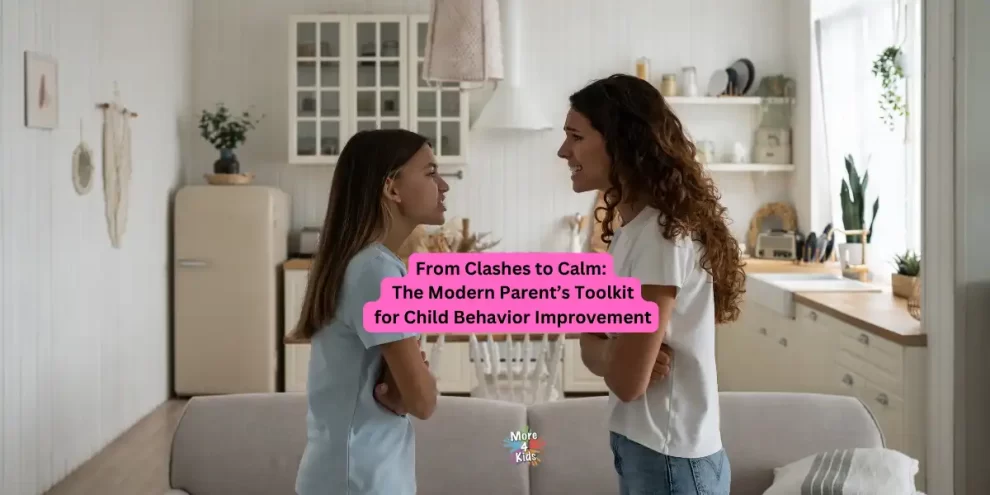One of the most researched topics in child development is what strategies are most effective in getting children to listen and behave better. Nearly every parent has or will experience the frustrating undertaking of managing temper tantrums, disobedience, and other behavioral challenges. As children age, the tools used to encourage positive behavior and conduct can also shift making it important for parents to stay informed and flexible in their parenting methods.
In this guide, we will explore tools, strategies, and practical approaches to getting your children to listen and behave better.
Know your Approach
Table of Contents
To understand the best approaches to parenting behavior it is essential to have a grasp of the basics. Every parent has a different approach to how they choose to interact and engage with their children. This early bond between parent and child helps to determine a child’s morals and influence their conduct. Many things can determine parenting styles including environment, culture, and personal experiences.
One of the most important ways to gain influence in your child’s behavior is to know your parenting style. There are four primary parenting styles indicated by scholars including authoritarian, authoritative, permissive, and neglectful.
Authoritarian Parenting:
In this style of parenting the parent often sets and establishes strict rules that the child is expected to obey. Often rigid, there is very little influence from the child, and limited flexibility is present in the system. Children who grow up with authoritarian parents are usually the most well-behaved because there is a clear understanding that behaviors lead to consequences. In the school setting, this may translate to the child being receptive to instructions, deadlines, and authority figures.
Despite this, scholars have indicated that authoritarian parents are usually less nurturing and the parenting style can lead to higher levels of aggression, shyness, and inability for the child to make their own decisions. These strict rules and clear consequences may also lead to rebellion against authority figures as the child grows older and attempts to establish their independence.
Class Disruption
Julie and Martin received a call home that their 12-year-old son Kevin was misbehaving in class. The teacher notes, that although Kevin excels in his academics he is often a distraction to his classmates. In the most recent instance, the teacher removed Kevin from his class after he repeatedly interrupted the lesson by engaging in conversation with nearby peers.
As authoritarian parents Julie and Martin set clear consequences for Kevin’s recent behavior:
Julie and Martin “ground” Kevin and he is not allowed to leave home outside of school activities. The parents determined the length of his consequences without influence from Kevin.
Kevin lost phone privileges and is not allowed to have access to social networks and gaming for the next two weeks. He must also personally apologize to Ms. Flowers, the teacher who called them regarding his behavior.
Authoritarian parenting styles are parent-driven and place high expectations on child behavior. When rules are broken, parents often respond with punishment. These systems may lack flexibility and communication is usually from parent to child.
What other concerns may be present?
Here, parents should also remain curious about what is leading Kevin to be a distraction to his other classmates.
Are there opportunities for Kevin to engage with peers outside of school?
Kevin may find time to distract other classmates because he is seeking peer connection and communication. Parents need to present their children with opportunities for them to collaborate with peers outside of the school setting. This parent-encouraged engagement can include participation in extracurricular activities, volunteering, or joining local community events.
Does Kevin need more challenging tasks at school?
Kevin could potentially be understimulated by the level of his academic work. Because the teacher mentions that Kevin is an excellent student academically, Julie and Martin should wonder if his behavior is a direct result of his lack of stimulation from the content.
Often, behavioral challenges in school can directly reflect a student’s ability to understand class material. Students who misbehave may find the work highly challenging or not challenging enough.
Authoritative Parenting
In this style of parenting, parents emphasize developing nurturing close relationships with their children. In the authoritative parenting style, there are guidelines in place for what is allowed. When children break rules or misbehave disciplinary actions are implemented instead of punishment. Parents of this style may take influence from their child on expectations, rules, and boundaries. Most known for maintaining a delicate balance of rules and flexibility, authoritative parents encourage communication with their children to help them work through difficult emotions.
This style of parenting is indicated as having the best outcomes for children. Parents who engage in authoritative parenting often note children with high levels of confidence, responsibility, and the ability to self-soothe and regulate.
Unlike authoritarian parenting, authoritative parents are often warm, receptive, and open to receiving influence from their children.
An Outburst at Dinner
Alisha and Steve are the busy parents of three school-aged children. Their youngest daughter, Kaylee is 7 years old and they also have two sons Braxton and Brandon aged 13 and 16. Recently, while visiting a restaurant, Kaylee had a public outburst because Braxton and Brandon were allowed to order from the ‘grown-up’ menu.
As authoritative parents Alisha and Steve communicate with Kaylee to understand her frustration and help regulate her emotions. After Kaylee is calm the parents set clear boundaries.
Alisha and Steve help Kaylee regulate her emotions by taking deep breaths and calming her dysregulated nervous system. After Kaylee is calm, the parents listen to understand why Kaylee is frustrated. Kaylee expressed feeling left out because her older brothers were able to order from the adult menu while she was given the kid’s menu
Steve reassured Kaylee that her frustration was okay, but having a temper tantrum in public was not. After reminding her of table manners, the parents agree that the next time they go out for dinner Kaylee can have a choice to order from the adult menu.
What other concerns may be present?
Healthy sibling relationships are important in shaping children’s development. Often, this is the first natural environment for children to learn important life skills such as sharing, collaboration, and conflict resolution. Older siblings can serve as great models of behavior for their younger siblings. When getting along well, they can form strong bonds that provide emotional support and companionship.
Perceived unfair treatment
Sibling jealousy and conflict are common challenges that parents face and can lead to behavioral issues among children. Children may become jealous if they perceive unequal treatment between them and their peers. In the home, this treatment can come from parental attention, privileges, or responsibilities. In the above example, Kaylee felt left out when her brothers were allowed to order from the adult menu while she was restricted to the kid’s menu. This perceived unfair treatment led to a public temper tantrum.
Age and developmental differences
Age differences among siblings can lead to conflict as children of different ages have varying needs, abilities, and interests parents must consider these concerns when encouraging positive behavior. Authoritative parents like Alisha and Steve benefit from being able to support Kaylee in working through difficult emotions and regulating them. Because they approach the situation with open minds, they can communicate an effective solution for both parties to avoid the situation in the future.
Permissive Parenting
Permissive parents are often still warm and nurturing however, there are few guidelines or expectations imposed on their children. Parents of this style, often allow children to lead and figure things out for themselves. Rarely do permissive parents use discipline or strategies to redirect child behavior.
In this child-led system, limited rules and increased freedom can create unhealthy environments for children. The negative consequences of permissive parenting are often explored in research. Children parented by this style often lack good manners, boundaries, and accountability since they are not required or enforced at home. This style of parenting can encourage children to be impulsive, demanding, and lack-self regulation.
No limits
Sarah is a single mother raising her 10-year-old son, Jack. Sarah takes a very lenient approach when it comes to setting rules and boundaries for Jack. Her typical approach is to allow Jack to make his own choices without interference. On a Tuesday night, during their normal bedtime routine, Jack asks his mom if can he stay up late to play video games because he does not feel ready to go to sleep. Without hesitation, Sarah complies and agrees believing that Jack should be able to manage his own time.
The next day at school, Sarah receives a call from a concerned teacher. Jack did not do well on his homework assignment and spent most of her class catching up on sleep.
As a permissive parent, Sarah does not implement any consequences from Jack as he is allowed to do what he pleases without any restrictions. He often skips homework, neglects his chores, and spends hours online without limits.
What other concerns are present?
Permissive parenting can be a slippery slope for many parents. Often, parents adopt this style because they want to give their children independence and choice in their daily lives. However, the lack of structure and minimal rules create a pattern and have negative effects on a child’s development.
Single parents often face unique challenges due to the absence of a co-parent. In this absence, some single parents may adopt a permissive parenting style as a way to cope with the challenges they face. Allowing more freedom for their children can be a coping mechanism for single parents and a way to maintain a positive relationship with their children, avoiding conflicts that could add to their stress.
Parental Overindulgence:
Sarah indulges Jack’s desires and requests without considering the long-term impact on his behavior and development. Because his immediate happiness is prioritized he misses lessons on important life skills and discipline. Single parents might overindulge their children to compensate for the absence of the other parent. This can result in leniency regarding rules and boundaries.
Neglectful Parenting
Neglectful parenting, also commonly referred to as uninvolved parenting, is a style characterized by a lack of responsiveness, emotional support, and involvement in a child’s life. Parents who exhibit neglectful parenting most often meet the child’s basic physical needs like food and shelter but are emotionally distant and uninvolved in their child’s life. Similar to permissive parenting, there is a lack of control of the family system, and decisions are usually child-led. Usually, this style of parenting can highlight underlying issues and the need for more intense interventions. Dr. Rasna Kaur Neelam outlines some of the negative consequences of neglectful parenting and helps parents understand various types of parental neglect.
Poor Parenting, Poor Behavior
After tragically losing his wife in an accident Evan is adjusting to raising his 6-year-old son Tyler alone. In addition to transitioning to life without his wife, Evan is also struggling with untreated mental health issues. Evans’s primary focus is on his own needs and making enough money to afford the rent for himself and his son. He is often uninvolved in the day-to-day of Tyler’s life and his mother takes on a large part of the parental responsibilities. Due to the stress, Evan has also turned to unhealthy coping mechanisms to manage his emotions.
Recently, Tyler has been performing poorly and school and has had violent altercations with other students. As a neglectful parent, Evan does not speak with Tyler about his behavior and makes no effort to connect with the school.
What other concerns are present?
In this scenario, Tyler experiences neglectful parenting as he lacks the necessary care, supervision, and emotional support essential for growth and development. The neglectful environment can lead to negative consequences for Tyler including behavioral issues, academic struggles, and emotional distress. Because the primary caregiver is not emotionally uninvolved there is little room to redirect behavior and guide Tyler to the support he needs to properly manage grief and loss.
Untreated Mental Health Issues
Often, neglectful parenting styles may indicate deeper issues in the family system. Evan’s neglectful parenting style can be attributed to a range of concerns and challenges he is facing, which contribute to his inability to provide adequate care and support for his son. Coping with such significant loss can lead to depression, anxiety, and the inability to effectively parent, especially when combined with untreated mental health issues.
Tools and Strategies by Age
Toddlers (Ages 1-3)
Playful Redirection
Toddlers are naturally curious and seek to learn about their environment. When engaging in unwanted behavior, instead of scolding, redirect your toddler’s attention to a different activity by using excitement and enthusiasm
Non-Verbal Cues
As toddlers are learning ways to communicate their wants and needs parents must be constantly finding ways to engage with them. Using visual cues is a great way to encourage positive behavior. Visual cues with simple pictures can help toddlers understand simple tasks like cleaning up and washing hands.
Preschoolers (Ages 4-6)
Positive Reinforcement Chart
Charts can help to reinforce and guide children’s behaviors. Parents can use charts as a method of track and promoting good behavior. When a child engages in positive actions the parent can give them a sticker for the chart. After a certain amount of stickers, they can exchange them for a small reward.
Tip: If your child’s teacher uses a reward chart, implementing a similar system at home can encourage consistency in positive behavior
Mindfulness Activities
Teaching simple mindfulness activities such as deep breathing or counting can help preschoolers self-regulate and manage their emotions. Parents should encourage their children to use these tools often and model their usage in everyday practice.
School-Age Kids (Ages 7-12)
Family Time
As children age, increasing their responsibility and role in the family is important. Family time can be important for school-age kids as an outlet to discuss their feelings and concerns openly. Parents should encourage their kids to voice their opinions and help foster a sense of belonging
Increased Responsibilities
Assign your child age-appropriate chores and responsibilities. For many children, having a role within the family enhances their sense of pride and accountability leading to improved behavior and independence.
Teenagers (Ages 13-18)
Collaborative Decision-Making
Often, parents face challenges as their children grow their voice and independence. To encourage good behavior for Teens, parents should involve teens in family decisions especially those that affect them directly. When you show respect to your teens and their wishes, they are more likely to respect your rules and authority.
Peer Involvement
As we get older, the influence of our family system lessens, and that of our peer network increases. Having positive peer mentorship for teenagers is important. Parents can foster this relationship by creating opportunities for their teens to engage in extracurricular and community activities
Conclusion
In the hustle and bustle of parenting, cultivating good behavior and listening skills demands a blend of understanding, patience, and tailored approaches. As we have explored various parenting styles and unique strategies for different age groups it is clear that there is no universal formula for cultivating good behavior. Instead, encouraging good behavior is about learning your child and what approaches work best. Understanding your child’s needs and developmental stage is key in helping to reinforce good behavior and eliminate poor choices.
FAQ
-
What are the most effective strategies for improving child behavior?
Dive into research-backed techniques that help kids listen and cooperate more by setting clear expectations and using consistent, positive discipline are key to fostering better behavior in children.
-
How can parents manage temper tantrums effectively?
Stay calm and consistent during challenging moments.
-
Does positive reinforcement really work for kids?
Learn how rewarding good behavior can make a big difference in your child’s development.
-
At what age should parents shift their behavior management strategies?
Parents should consider adjusting their behavioral strategies as children enter new phases, such as starting school or hitting puberty.
-
What role does flexibility play in parenting for better behavior?
Understand why being adaptable can lead to more harmonious parent-child relationships.













Add Comment